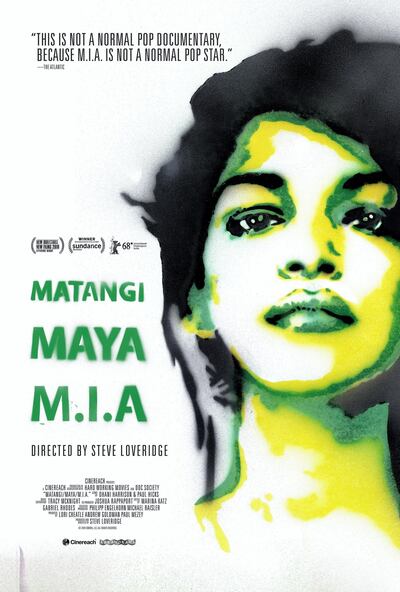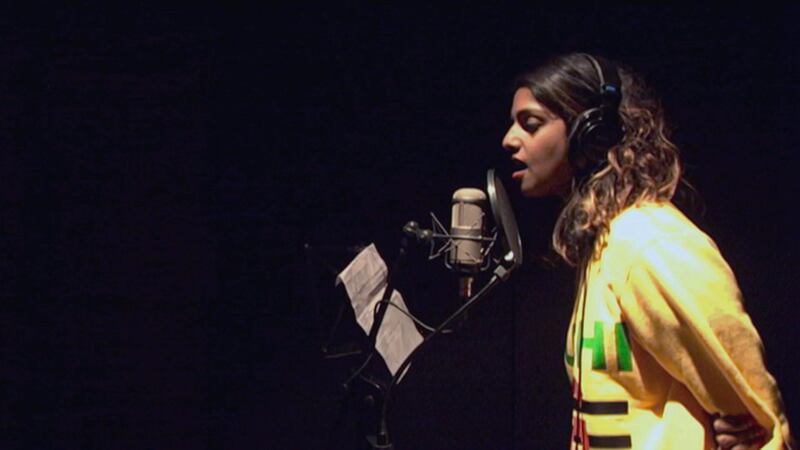When rapper, music producer, filmmaker, visual artist and activist M.I.A. first saw the documentary Matangi / Maya / M.I.A. at Sundance, she was upset. Awkward, given that its director, Steve Loveridge, is a former Central Saint Martins classmate, and the film is an authorised account containing video footage she had given to him. But despite the support and friendship, Loveridge insisted on keeping authorial control.
“I didn’t really like it in the beginning because I thought, woah, this is really personal,” the 43-year-old M.I.A., born Mathangi Arulpragasam, tells me. “I felt like it didn’t have enough arty thing in it, and no cool. He cut out all the cool.”
"The cool" has followed M.I.A. throughout her music career. Her two Romain Gavras-directed music videos, Born Free and Bad Girls, were certainly deemed high points for swag.
Born Free was the sensational 2010 video that allegorised imperialism and racism by depicting genocide against red-haired people. The film was banned by YouTube, reinstated with an age restriction and then taken off again. Salon hailed Born Free as "a nine-minute masterpiece".
Incredibly, M.I.A. and Gavras managed to top their first effort with the sensational Bad Girls video in 2012. Shot in Ouarzazate, Morocco, the lauded visuals contained imagery of Arabs performing stunts in cars being driven sideways on two wheels and women wearing combat hijabs. Clips from both of those videos made it into Loveridge's documentary, however, M.I.A. says she has moved on from them: "I wouldn't have even put the bits from those two music videos in," she reveals. "People have already seen those. What they haven't seen is the other stuff."
In Loveridge's defence, Matangi / Maya / M.I.A. is a dynamic and thought-provoking film, stripping back the scandalous news headlines and humanising M.I.A. "The hope is that the documentary is a starting point to go and look at all the other stuff," Loveridge tells me. "You see the documentary and then if you want to watch the music videos they're instantly accessible. If you want to find out about Sri Lanka and the political side and the activism, that's also available online in more detail."

Spending time in the company of M.I.A. I get the feeling that she revels in arguments. She’s fallen out and made up with Loveridge a number of times, and conflict has always been a major part of her life.
Born in London in 1973, she moved with her family to Tamil-controlled northern Sri Lanka where she lived until the age of 9 before moving to India for two years. There, her father, an engineer and writer, adopted the name “Arular” as he turned to political activism arguing for the creation of a new Tamil state to the north and east of Sri Lanka, a cause leading to a civil war that would ravage the island for years. M.I.A. named her first album after him. This dramatic family history forms a large part of the new documentary and the rapper concedes, “There is so much of the film that is important to me, like the Sri Lanka section.”
From the age of 11, M.I.A. lived in social housing in south London where she experienced racism and violence, and where she was exposed to hip-hop. She would bash these different worlds together after attending Central Saint Martins to study visual art and film. It was here where she met Justine Frischmann of the band Elastica who commissioned her to make a film documenting the group’s American tour in 2001. Around the same time, she first picked up a groovebox and transformed herself into M.I.A. “Music was instant and it was cheap,” she says about her move from film to songwriting. “I never realised that I would have a natural affinity to it. I came to it when I was old as it didn’t cross my mind that I would be musical.”
M.I.A.'s music was so original and striking that Rolling Stone magazine named her one of the defining artists of the decade in 2009, impressed by the range of influences that she sampled – from Asian folk and Tamil soundtracks to hip-hop, electronica and reggae. Her second album, Kala, released in 2007, was a huge hit, although she believes her bestselling record, 2010's Maya, was the start of the music industry kickback against her.
“I made this album about how we should not see the internet for only its capitalist value and tried to discuss fake news, but I got shut down,” she explains. “Because musicians are not allowed to be smart or step out of their zones, especially a brown person touching something so fresh.”

That didn't stop Madonna from calling M.I.A. in 2011. They co-wrote and performed the song Give Me All Your Luvin, which appeared on Madonna's 2012 album MDNA. But things turned sour between superstar and rising star, and soon after, M.I.A. gave a middle-fingered salute at the camera during Madonna's half-time Super-bowl show in February 2012. The NFL threatened to sue M.I.A. and Madonna distanced herself from her. "It was after the NFL thing that I discovered [Hindu goddess] Matangi," she says. "She is like a goddess of music who is outside the mainstream and lives on the periphery of society."
In recent years, M.I.A. has let her record contracts run down to take control of her own destiny. The documentary feels like it is part of a career relaunch, but it is unclear to what ends.
M.I.A. says she is writing a film script, but we wouldn’t be surprised if she also released a surprise album sometime soon as M.I.A. has somehow always managed to surprise us and bring life on the margins to the mainstream.
______________________________
Read more:
Oumou Sangaré is blazing the trail for African woman
Mandela Trilogy: The role of music in the anti-apartheid movement
Saad Lamjarred's case reopens Morocco violence against women debate
______________________________






